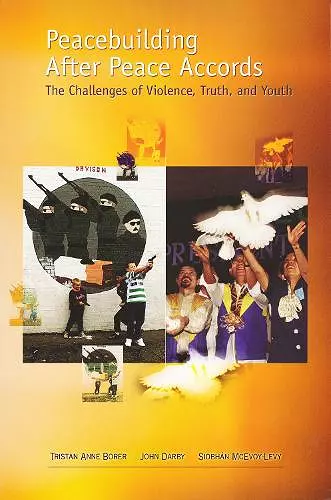Peacebuilding After Peace Accords
The Challenges of Violence, Truth and Youth
John Darby author Tristan Anne Borer author Siobhan McEvoy-Levy author
Format:Paperback
Publisher:University of Notre Dame Press
Published:1st Feb '07
Currently unavailable, and unfortunately no date known when it will be back

During the 1990s, optimism abounded because international violence was in decline. The number of armed conflicts decreased worldwide from more than fifty in the early 1990s to fewer than thirty a decade later. This drop resulted largely from negotiations leading to peace accords. However, in a disturbingly large number of places, war was actually succeeded not by peace but by a stalemate. Peace accords were plagued by problems, including economic hardship, burgeoning crime, postwar trauma, and persistent fear and suspicion. Too often, negotiated settlements merely opened another difficult chapter in the peace process, or worse, led to new phases of conflict.
This disappointing record is the subject of a multiyear project conducted by the University of Notre Dame’s Research Initiative on the Resolution of Ethnic Conflict (RIREC). Located at the Joan B. Kroc Institute for International Peace Studies, RIREC explored three significant challenges of the postwar landscape: the effects of violence in internal conflicts after peace agreements have been signed; the contributions of truth-telling mechanisms; and the multidimensional roles played by youth as activists, soldiers, criminals, and community-builders. The project led to the 2006 publication of three edited volumes by the University of Notre Dame Press: John Darby’s Violence and Reconstruction; Tristan Anne Borer’s Telling the Truths: Truth Telling and Peace Building in Post-Conflict Societies; and Siobhán McEvoy-Levy’s Troublemakers or Peacemakers? Youth and Post-Accord Peace Building.
In Peacebuilding After Peace Accords, the three editors revisit the topics presented in their books. They examine the dilemmas each of the three challenges presents for postwar reconstruction and the difficulties in building a sustainable peace in societies recently destabilized by deadly violence. The authors argue that researchers and practitioners should pay greater attention to these challenges, especially how they relate to each other and to different post-accord problems. A foreword by Archbishop Emeritus Desmond Tutu sets the context for this volume, and an afterword by Eileen Babbitt reflects on its findings.
“Forgiveness and reconciliation have been shown not to be nebulous, namby-pamby things. No, they are the stuff of realpolitik. The alternative, the way of revenge, of retribution, leads to a ghastly cul-de-sac—the spiral of reprisal-provoking counter reprisal ad infinitum, ending with no security, no peace, but a toll in human lives and property that is inexorable and exorbitant. It is not to be merely idealistic to say that without forgiveness there is no future; it is being a hard-nosed realist. Just ask the people of the Middle East and of Northern Ireland or Sri Lanka or Rwanda. True peace and real security will never come from the barrel of a gun, however overwhelming. Peace and security come because all enjoy justice and freedom. Peace and security come because it is acknowledged that people matter.” —from the foreword by Archbishop Emeritus Desmond Mpilo Tutu
ISBN: 9780268022044
Dimensions: 229mm x 152mm x 7mm
Weight: 184g
124 pages